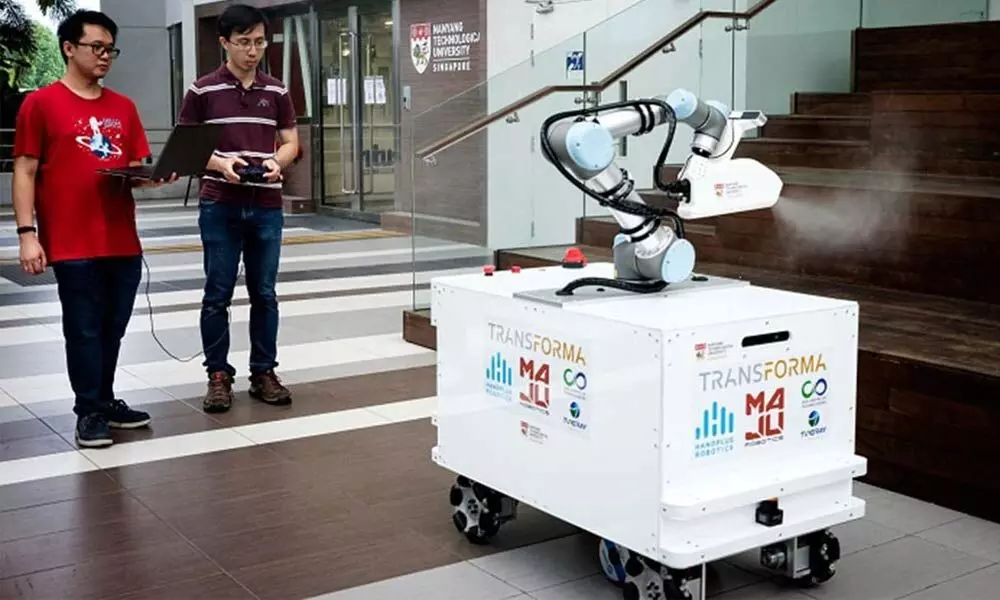Live
- Janhvi style & grace takes centre stage
- Allu Arjun’s Pushpa 2 Becomes First Hindi-Dubbed Film to Cross Rs 700 Crore
- ‘Legally Veer’ pre-release event creates buzz
- ‘Chinni’ from ‘Daaku Maharaaj’ that strikes a chord with audience
- A raw and intense love story ‘Premikudu’ set to captivate audiences
- Apple iPhone 15 Now Available for Rs 26,999 on Flipkart – Grab the Deal Today!
- AP Fibernet Corporation to dismiss 410 employees, says GV Reddy
- Soul-stirring folk anthem ‘Shiva Shiva’ from ‘KD - The Devil’ released
- Actor Dharma gears up for his debut in Tollywood
- Saiee Manjrekar FL from ‘The India House’ unveiled
Just In
New disinfection robot to aid cleaners in COVID-19 fight


Singapore: Scientists have developed a semi-autonomous robot that can disinfect large surfaces quickly, and reduce the risk of cleaners picking up the...
Singapore: Scientists have developed a semi-autonomous robot that can disinfect large surfaces quickly, and reduce the risk of cleaners picking up the novel coronavirus from potentially contaminated areas.
The researchers from Nanyang Technological University (NTU) in Singapore are planning to have public trials to support the fight against COVID-19.
Named eXtreme Disinfection roBOT (XDBOT), it can be wirelessly controlled via a laptop or tablet, removing the need for cleaners to be in contact with surfaces, the researchers said.
The new robot differs from other disinfection robots currently on the market that are primarily intended to clean and vacuum floor surfaces and are unable to disinfect odd-shaped surfaces or anything above ground level, they said.
Comprising a semi-autonomous control unit with motorised wheels, XDBOT has a six-axis robotic arm that can mimic human movement to reach awkward locations such as under tables and beds, as well as doorknobs, tabletops and light switches.
Instead of a conventional pressure-spray nozzle, it uses an electrostatic-charged nozzle to ensure a wider and further spread of the disinfectant, behind and over hidden surfaces, according to the researchers.
Unlike typical nozzles, XDBOT's nozzle discharges chemicals with a positive electrical charge, they said.
These disinfectants, the researchers noted, will then be attracted to all negatively-charged surfaces.
Surfaces already covered with the disinfectant will then repel the spray, making this method very efficient, they explained.
Professor Chen I-Ming, a roboticist at NTU, said the XDBOT was conceived when COVID19 cases started to spike worldwide in mid-February, and disinfection efforts were being stepped up at airports, hotels and hospitals.
"To stop the transmission of a virus means we need a way to quickly disinfect surfaces, which is a labour-intensive and repetitive activity," Chen explained.
"Using our new robot from a distance, a human operator can precisely control the disinfection process, increasing surface area cleaned by up to four times, with zero contact with surfaces," he said.
XDBOT can navigate semi-autonomously in any environment using LIDAR (Light Detection and Ranging) and high-definition cameras, while its arm is controlled by a human operator -- like a tank with a rotating turret, the researchers said.
The operator can control the robot from up to 30 metres using a laptop or a tablet, which can be increased to 50m or further with more antennas installed on XDBOT, they said.
The researchers said the robot possesses an 8.5 litre tank that can carry a variety of disinfectants appropriate to different environments such as childcare centres, hospitals, nursing homes and shopping malls.
They said it can run for four hours continuously on a rechargeable battery pack and is estimated to be able to disinfect a surface area of up to four times that of manual cleaning.
Recharging its batteries takes eight hours at present, but the researchers said this can be further improved if quick-charging technology is adopted.

© 2024 Hyderabad Media House Limited/The Hans India. All rights reserved. Powered by hocalwire.com






